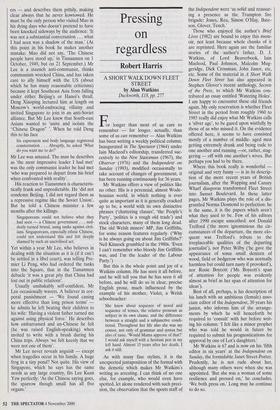Pressing on regardless
Robert Harris
A SHORT WALK DOWN FLEET STREET by Alan Watkins Duckworth, f18, pp. 277 For longer than most of us care to remember — for longer, actually, than some of us can remember — Alan Watkins has been writing a weekly political column. Inaugurated in The Spectator (1964) under Iain Macleod's editorship, transferred sue- cesively to the New Statesman (1967), the Observer (1976) and the Independent on Sunday (1993), modified occasionally to take account of changes of government, it has been running continuously for 36 years.
Mr Watkins offers a view of politics like no other. His is a perennial, almost Wode- housian world, in which nothing is ever quite as important as it is generally cracked up to be, a world with its own distinctive phrases (`chattering classes', 'the People's Party', 'politics is a rough old trade') and stock characters, many of them long dead. The old Welsh miners' MP, Jim Griffiths, for some reason features regularly. ('Why is he always going on about Jim Griffiths?' Neil Kinnock grumbled in the 1980s. 'Even I can't remember who bloody Jim Griffiths was, and I'm the leader of the Labour Party.') But this is the whole point and joy of a Watkins column. He has seen it all before, and he will tell you that he has seen it all before, and he will do so in clear, precise English prose, much influenced by the example of his mother, Violet, a Welsh schoolteacher:
She knew about sequence of mood and sequence of tenses, the relative pronoun as subject in its own clause, and the difference between a straight and a subjunctive condi- tional. Throughout her life also she was my censor, not only of grammar and syntax but also of taste. 'Would Mama approve of that?' I would ask myself with a hesitant pen in my left hand. Almost 15 years after her death, I ask it still.
As with many fine stylists, it is the unexpected juxtaposition of the formal with the demotic which makes Mr Watkins's writing so arresting. I can think of no one else, for example, who would even have spotted, let alone rendered with such preci- sion, the observation that the sports staff of the Independent were 'as solid and reassur- ing a presence as the Trumpton fire brigade: Jones, Rea, Simon O'Hay, Bate- son, Glover, Tench.'
Those who enjoyed the author's Brief Lives (1982) are bound to enjoy this mem- oir, not least because whole chunks of it are reprinted. Here again are the familiar stories of the author's father, D. J. Watkins, of Lord Beaverbook, lain Macleod, Paul Johnson, Malcolm Mug- geridge, Dick Crossman, John Junor, etc, etc. Some of the material in A Short Walk Down Fleet Street has also appeared in Stephen Glover's recent anthology, Secrets of the Press, to which Mr Watkins con- tributed an essay entitled 'Watering Holes'. I am happy to encounter these old friends again. My only reservation is whether Fleet Street in the period from roughly 1960 to 1985 really did enjoy what Mr Watkins calls a 'silver age', to be gazed upon wistfully by those of us who missed it. On the evidence offered here, it seems to have consisted mostly of a number of middle- aged men getting extremely drunk and being rude to one another and running —or, rather, stag- gering — off with one another's wives. But perhaps you had to be there.
Where this book really is wonderful original and very funny — is in its descrip- tion of the more recent years of British journalism, after the Wapping and Canary Wharf diasporas transformed Fleet Street into Sunset Boulevard. In these latter pages, Mr Watkins plays the role of a dis- gruntled Norma Desmond to perfection: he is the same, it is the papers which aren't what they used to be. Few of his editors after 1990 escape unscathed: not Donald Trelford (`-the more ignominious the cir- cumstances of the departure, the more elo- quent was Trelford's tribute to the irreplaceable qualities of the departing journalist'), nor Peter Wilby (`he gave the appearance of some small denizen of wood, field or hedgerow who was normally harmless but could turn nasty if provoked'), nor Rosie Boycott (Ms Boycott's span of attention for people was evidently almost as brief as her span of attention for ideas').
Best of all, perhaps, is his description of his lunch with an ambitious (female) asso- ciate editor of the Independent, 30 years his junior, who informs him of the arrange- ments by which he will henceforth be required to 'consult' with her before writ- ing his column: 'I felt like a minor prophet who was told he would in future be required to submit his prognostications for approval by one of Lot's daughters.'
Mr Watkins is 67 and is now on his 'fifth editor in six years' at the Independent on Sunday, the formidable Janet Street-Porter. Prudently, he is not rude about her, although many others were when she was appointed. 'But she was a woman of some resilience and pressed on,' he concludes. `We both press on.' Long may he continue to do so.


























































































 Previous page
Previous page